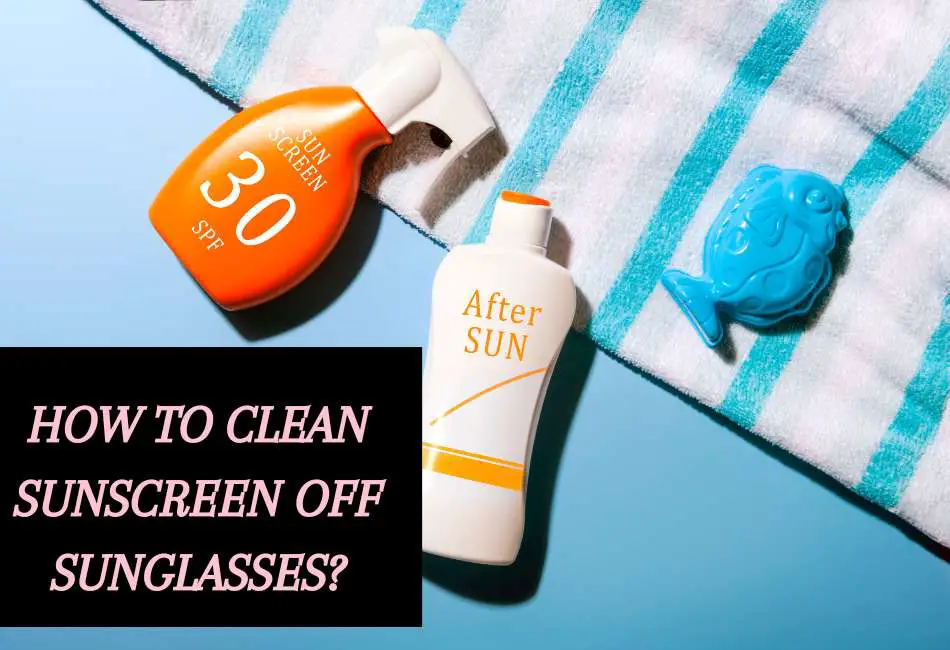Sunscreen splatters onto your sunglasses – a common yet irritating issue many of us face during the sun-soaked months.
The unexpected smear of lotion not only mars the aesthetic appeal of your shades but can also significantly impede your vision.
This is particularly concerning as clear vision is paramount when wearing sunglasses to protect your eyes from harmful UV rays while maintaining optimal visibility.
This article will introduce you to five simple yet effective home remedies to rid your sunglasses of that stubborn sunscreen residue, restoring clarity to your summer vision.
Home Remedy 1: Soap and Water
Without a doubt, the simplest and most accessible remedy to get sunscreen off your sunglasses is using soap and water. You’d be surprised how well this household staple can clean up your smeared shades!
The Simplicity and Accessibility of this Remedy
Remember when I splattered sunscreen on my favorite sunglasses during a family picnic?
I panicked initially but remembered a simple remedy – good old soap and water. It’s so simple, yet it does the trick! And the best part? These are items we all have readily available at home.
Step-by-step guide on using mild soap and lukewarm water
Here’s a quick rundown of how I tackled the sunscreen smear. First, rinse your sunglasses under lukewarm water to remove any loose dirt or dust.
Then, apply a small amount of mild soap to your fingers and gently rub it onto the sunscreen smears. Rinse it off under running water, and voila! You have a clean pair of shades!
The Importance of Gentle Cleaning to Avoid Scratches
Remember, it’s crucial to be gentle throughout this process. I learned this the hard way when I was too enthusiastic and had a noticeable scratch on my lenses.
Always use your fingers instead of a rough cloth to avoid scratching your sunglasses.
Home Remedy 2: White Vinegar Solution
If soap and water don’t do the trick, don’t worry – white vinegar is here to save the day!
White Vinegar as a Cleaning Agent
In college, I learned that white vinegar isn’t just for cooking – it’s an excellent cleaning agent.
When my soap and water trick failed to remove a stubborn sunscreen smear from my sunglasses, I turned to my trusty bottle of white vinegar.
Mixing White Vinegar with Water
I mixed equal parts of white vinegar and water to create the cleaning solution. I dipped a soft cloth into the solution and gently wiped my sunglasses. It worked like magic!
Antibacterial Properties of White Vinegar
Besides its cleaning prowess, white vinegar also has antibacterial properties. So, while removing the sunscreen smear, it’s also disinfecting your sunglasses. Now, that’s what I call a win-win!
Home Remedy 3: Baking Soda Paste
Ah, baking soda. Where would my cleaning routine be without it? I love its fantastic ability to clean almost anything, including stubborn stains on sunglasses.
Baking soda can thoroughly clean, dislodging tougher grime and stains thanks to its slightly abrasive nature. However, remember, this abrasive nature is also why we must be careful.
Creating a Paste with Baking Soda and Water
To use baking soda on your sunglasses, create a simple paste. I typically use a 1:1 ratio of baking soda to water.
Just a teaspoon of each should be enough. Mix them until you have a paste that’s easy to spread but not too runny.
Gentle Application to Prevent Lens Damage
Here’s where the caution comes in. Because baking soda is abrasive, you must be super gentle when applying the paste to your sunglasses.
I learned this the hard way when I was a little too vigorous and left minor scratches on my favorite pair of Ray-Bans.
Home Remedy 4: Rubbing Alcohol
Now, let’s talk about rubbing alcohol. Known for its impressive solvent properties, rubbing alcohol can help dissolve sunscreen smears and leave your sunglasses looking as good as new. There’s a reason it’s a staple in my cleaning cupboard!
Proper Dilution and Application of Rubbing Alcohol
To use rubbing alcohol on your sunglasses, you must dilute it with water. I usually stick to a 50:50 ratio to ensure it’s not too strong.
Dampen a soft cloth with this solution and gently wipe your sunglasses. Remember, less is more when it comes to rubbing alcohol.
Caution Regarding Potential Damage to Lens Coatings and Necessity for a Patch Test
Be warned, though! Rubbing alcohol can potentially damage certain lens coatings, so doing a small patch test is important first.
I once ruined a pair of sunglasses by skipping this step – a mistake I won’t be making again.
Always test the solution on a small, inconspicuous part of the lens before cleaning the entire surface. Your sunglasses will thank you!
Home Remedy 5: Lemon Juice
Lemons are a kitchen staple and a savior for sunscreen-smeared sunglasses—the secret lies in the acidity.
With its natural citric acid, Lemon juice offers incredible cleaning properties that can cut through stubborn sunscreen grime.
Using Lemon Juice as a Natural Cleaning Solution
To create your own natural lens cleaner, squeeze the juice from a fresh lemon and mix it with equal water.
This diluted lemon juice works wonders on sunscreen smears. My grandmother taught me this method, and I’ve used it ever since!
Be mindful, though. The acidic nature of lemon juice means it can potentially harm certain lens materials.
I learned this the hard way after cleaning expensive sunglasses and noticing a slight cloudiness afterward. Remember, always do a patch test first!
Conclusion
Having clear vision while wearing sunglasses is not just about maintaining a stylish image—it’s about safety.
We’ve explored five home remedies for removing stubborn sunscreen from your sunglasses: baking soda, toothpaste, dish soap, rubbing alcohol, and now, lemon juice.
Each remedy has advantages and cautions, and choosing one that suits your lens material and personal preference is important.
I’ve made a few mistakes but learned valuable lessons about what works best for my glasses.
These home remedies are practical and cost-effective, proving that you don’t always need expensive lens cleaners to keep your sunglasses spotless.
So the next time you find your shades smeared with sunscreen, remember, your solution may be in your kitchen cupboard!

